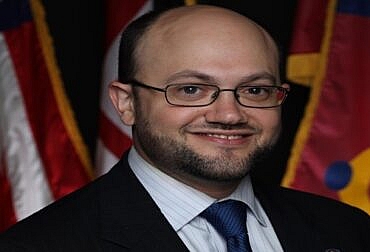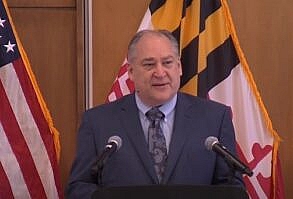David Moon is a Member of House of Delegates since January 14, 2015. Vice-Chair, Judiciary Committee, 2021- present. He born in Takoma Park, Maryland. Attended Walt Whitman High School, Bethesda, Maryland; Tufts University, B.A. (sociology, philosophy), 2001; Washington College of Law, American University, J.D., 2004. Admitted to Maryland Bar, 2004. Chief Operating Officer, FairVote, 2004-09. Campaign Director, Senator Jamie B. Raskin, Montgomery County, 2006. Director, Purple Line Now, 2008. Campaign Manager, Nancy Navarro, Montgomery County Council, District 4, 2008-09. Get Out the Vote Director, Maryland Democratic Party, 2010. Founder and Editor, Maryland Juice, 2011-present. Director, Voter Registration and Get Out the Vote, CASA de Maryland, 2012. Executive Director, Communities for Transit, 2013.
Achievements:
Nagender Madavaram: Thanks Delegate David Moon for giving me time. Your contribution to Maryland legislature is amazing. You have achieved lots of things within short span of eight years. It can’t be covered in one session. What are your main success legislations?
David Moon: Thanks, Nagender for having me today. I was born and raised in Tacoma Park, Montgomery County. I was elected to the House of Delegates, Maryland in 2014. Actually, my parents came from Korea to the United States. I got more and more involved in social and economic justice issues, from high school through college, law school and beyond. Like, you know, some people choose to focus on specialized field, but broad social and economic justice issues attracted me. I tend to try and help those issues that I care about when they’re sort of having a ripe, catalytic moment where they need a good push over the finish line to help the advocates, my public policy friends and colleagues to be successful in those key moments. You know, previously I used to work at an organization called Fairvote that worked on everything from refranchising to members returning to society, to rank choice voting and things like that. You know, that was a good chunk of my life. It’s where I first met Jamie Raskin. He was a board member there, and so I ended up managing his first campaign for state Senate. But the election reform issue is always stuck with me. I’ve done a number of bills on election reform on everything from trying to get corporate money out of our state and local elections to having special elections for U.S. Senate, Attorney General and Comptroller. Instead of having our governor have a large role in choosing officials. I think this has been greatly owing to my interest in election issues.
The other basket I would point out is, I’m on the Judiciary Committee. After serving eight years, I have risen to vice chair of the committee, and in that time, I’ve developed a pretty clear and strong philosophy and agenda. I’ve really tried to focus on decriminalizing poverty and public health issues. You know, we have a lot of challenges in the state where we’re making laws and working with law enforcement agencies to address nonviolent drug offenses. Crimes of poverty needed really different interventions. Obviously, it’s been a huge team effort from Attorney General Brian Frosh, my counterpart in the Senate, Will Smith. Of course, my colleague Delegate Clippinger, joined me to make the justice system more friendly.
I would point to immigrants’ issues. I grown up in an immigrant household. I get quite irritated at the xenophobia and anti-immigrant sentiment that’s risen up politically in recent years. Defending the community from some of these ridiculous allegations has been something personally important to me. So, it’s been a legislative interest too.
Tenant’s Rights:
Nagender Madavaram: What is your perception of landlord’s property rights and tenant’s rights? How successful you are in protecting tenant’s rights.
David Moon: So again, I’m on the Judiciary Committee. I can speak from a COVID-19 perspective. There were a lot of things advocates have asked for during a normal year. You know, before the pandemic, things like some sort of control out of skyrocketing housing prices both for sale and for rent. People would make different arguments about property rights and tenant’s rights. In the pandemic, I think we saw for the first-time mass adoption and utilization of all sorts of those kinds of housing protections that we had not seen before. So that’s one interesting aspect I would flag. So, I think you’ll see in the coming session some efforts to try and keep the best parts of some of that pandemic housing policies.
I would be remiss if I wouldn’t also point out that we had number of measures that Governor Hogan vetoed. Playing to both commercial and residential tenants. For example, we had a bill that New York passed that if you were a small business owner and you were shut down by the government for public safety in pandemic but your landlord can’t seize your personal property for late rent. So, New York passed that legislation, it was sued and it was found to be OK again as extraordinary measures during the pandemic in order to protect small business owners. I saw how successful it was working in New York. So, I brought it to Maryland, with support of my colleague in the Senate, Shelly Hettleman the bill was introduced. We had hearings and it passed. It got heavily watered down and it didn’t automatically protect the small business owners. All it said was that the landlords couldn’t immediately try to go after your assets. It had six months waiting period till after the COVID emergency expired before they could even try something like that. So, it was really just delaying and buying these small business owners some time to breathe and get things back to normal once the reopening happens. Well, Hogan vetoed the bill. You know, we’ll fight like crazy to get some very modest tenant’s protections. We’re unable to do anything until January, 2023 but we’re going to keep at it.
Decriminalization of Marijuana:
Nagender Madavaram: You tried to make decriminalizing the use of marijuana. How successful you are in making policies?
David Moon: Well, admittedly this conversation is going to go on for years. There are few reasons. When you talk about marijuana policy, marijuana legalization, whatever you want, there’s different things to different people. So, for me, the first question is, what does the criminal law look like? And how much jail time is associated with what activity is at 0? Is it one year, six months? What does it look like? You know, marijuana is essentially truly illegal if the possession or use, especially in any low quantity. A person would go to jail for having marijuana and get a criminal record. My primary goal as I had noted in previous comments that having a system filled with nonviolence criminal offenders, we can argue the merits of that all day, but it’s not the only and certainly not the best way of addressing public health issues.
We’re now in a situation where literally hundreds of thousands of Maryland residents have criminal records where the only charge on at least this count was possession of marijuana. I passed a bill to allow people to expunge the record. Not many people know about it. So, they’re just sitting there with this criminal record for no good reason on their record. If the voters say yes this November, then about a year from now, possession and use of a small amount of marijuana will be legal.
Now that doesn’t answer the other question. Where do you get marijuana? So, this whole question about the business licensing structure is very complicated because there are equity issues. But we have existing medical marijuana businesses that have now set up and invested, and we have other people who have different ideas about how we should do licenses or whether we need licenses at all. A lot of people need to be involved in that conversation. I think we can move forward. At least I can say that if the voters say Yes for a question on the ballot, about whether you believe the jail time should be removed on possession of a small amount of marijuana or plants? The mandate will answer the major issue.
Property Taxes of Country Clubs:
Nagender Madavaram: You opposed property tax relief for country clubs. Did you get success in your attempts?
David Moon: My step in this process has concluded, at least for some time. It is true across the country that country clubs enjoy very generous property tax conditions that are really usually reserved for like nonprofit or church or something like this. Country clubs have very preferential property tax bills. You know, the problem like, you have some rural golf courses. One is fairly modest. We can look at the balance sheet if they’re not doing so well it is appropriate to give them tax exceptions. We have other scenarios in Montgomery County, where you have very exclusive country clubs where they have waiting lists. They charge very high initiation fees and they have multiple staff members making 6 figure salaries. The land underneath the club is very valuable. So, the amount of property taxes were being deprived in that prime area. Right now, they’re paying pennies on the dollar for property tax. So, I had a bill, I put it few times to repeal this whole mess but I learned a lot about how this system works.
The government has signed contracts with these clubs, sometimes for many years to allow them to keep to stay at this rate. We’re unable to tamper with the contract that the government has already entered into. So, you ask yourself, why would the government sign a 30-year contract? You know, for very exclusive Country Club with very powerful members to basically pay 0 tax for 30 years? No future government can do anything about it because it’s locked in a contract. I mean, this sort of stuff is crazy. So, we’ve been trying to put a time limit on the length of these property tax agreements and bring more scrutiny to it. The one thing I was able to do was double the property tax assessment. Thanks to my very diligent Montgomery County colleagues who helped to broker some sort of compromise on this issue. So, we doubled their bill but I have to admit, even with the doubling, they are getting a ridiculously low tax. So, I wish the next generation good luck in picking up the baton from here. That being said, I think we and Maryland may have gotten further on reforming this issue. I, at least feel good about the fact that we are having a very serious conversation about Country Club practice.
Foster Youth:
Nagender Madavaram: Your interesting subject is foster youth. How are you helping them?
David Moon: I’m glad you raised it. I don’t know how much people pay attention to foster youth but I like to think of them. These are children in the custody of the state, meaning they are our children. The state is taking care and responsibility for these kids, at least for some time. You know, all of the other things I’ve been talking about on these nonviolent offenses like drug issues. When I first got to the legislature, one of the ridiculous situations that was pointed out to me was that we had foster children who were severely developmentally disabled.
What happens in the foster system is that at some point, at the age of 21, the system withdraws responsibility. You’re in many ways on your own. The foster system cuts you out from medical services or downgrade them because of your age even though you are a severely developmentally disabled. Well, for some people that’s life-threatening situation. So, the advocates came to me. We were able to get the continuation of care. We’re just talking about a few million bucks a year. Again, these are our kids and they need the care of the state in order to keep them going. These are the most unfortunate cases end up in the foster care system.
The other aspect is you know after they age out and leave the system, they get nothing but a bag of clothes. They carry out their clothes and nothing else. One thing the advocates been pointing out for years is that in Maryland, the state government was applying for federal benefits in the name of the children because they qualify. The government was reimbursing itself for taking care of the foster kids. The fact is, it never actually gave the benefits to the children. It gives them nothing when they leave the system. So, I worked with the advocates and colleagues. We made changes and started saving account in banks for the children to deposit a little bit of money and then to match it so that they would get incentives to save. So, all of this has been very difficult to achieve because these things cost money and unfortunately, it’s a fight. It’s been a fight to make these priorities in the state budget. But you know, those are not the sexiest issues, but those are actually some of the most important bills I’ve worked on.
Nagender Madavaram: The current system is designed to allow foster children to work in government sector not in private sector. Many children are missing opportunity to grow their career. There are limited opportunities in government. Most of the foster youth are unemployed. There is shortage for workforce in the county. Do you think further reforms are needed in this field.
David Moon: Yeah, we need to be able to make these sorts of connections. Honestly, we need to scale it up. We keep talking about it. You’re right. I would love to see it on a much more direct basis. There is much higher rate of homelessness among foster population compared to other young people. So again, you know, we have to be proactive in keeping our eye out for them if we’re really going to take our role seriously. Foster kids are our children, at least for the time being, they are the children of the state.
Agenda for Next Term:
Nagender Madavaram: What is your agenda for next four years? What you want to achieve?
David Moon: Well, I can’t tell you about the exact agenda because I try to move where things are important. Obviously, we’re going to be looking at firearms and abortion. Some of these things are going to be obvious topics that people want to discuss. I don’t want to just speak a little bit more generally for a minute. I’ve spent now my whole eight years in office with a Republican Governor. I am determined that this time moving forward as we’re going to be with a democratic administration.
The next four-year term, at least initially, I have two goals. One is to go back and find all of the bills that were vetoed by Governor Hogan over the last eight years and try to bring back as many of them as possible under a democratic administration. The next goal is to find any bills that we couldn’t pass because people didn’t want to pass them under Hogan administration and pass those bills. Lastly, we have had government agencies that were hostile with modern democratic policies thinking on anything from transportation to the environmental enforcement where I would really like to address hostility. I would like the incoming governor to do better job than what the Hogan administration did in terms of staffing and enforcement.










